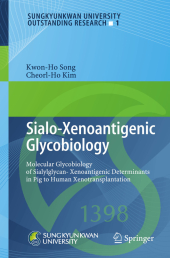 Neuerscheinungen 2014Stand: 2020-02-01 |
Schnellsuche
ISBN/Stichwort/Autor
|
Herderstraße 10
10625 Berlin
Tel.: 030 315 714 16
Fax 030 315 714 14
info@buchspektrum.de |

Cheorl-Ho Kim, Kwon-Ho Song
(Beteiligte)
Sialo-Xenoantigenic Glycobiology
Molecular Glycobiology of Sialylglycan-Xenoantigenic Determinants in Pig to Human Xenotransplantation
2013. 2014. xvi, 64 S. 34 SW-Abb.,. 235 mm
Verlag/Jahr: SPRINGER, BERLIN; SPRINGER BERLIN HEIDELBERG 2014
ISBN: 3-642-43443-6 (3642434436)
Neue ISBN: 978-3-642-43443-3 (9783642434433)
Preis und Lieferzeit: Bitte klicken
The latest advances from leading experts in this vital field of medical endeavor comprise the core value of this book, which focuses on the molecular biology of carbohydrate antigens, including sialic acids, which function as xenoantigenic determinants in humans.
Carbohydrate antigens on glycoconjugates of mammalian cells play crucial roles in various biological processes and are epitopes recognized by the immune system, as glycobiology has hugely been progressed during the past two decades. The book focuses on sialic acid-based xenoantigenes. In pig to human xenotransplantation, exposure of pig organs to human blood results in hyper acute rejection (HAR), caused by differences in carbohydrate epitopes between human and pig vascular endothelia. Although Gal-antigen as major antigen was eliminated, the remaining non-Gal antigens are considered to be xenoantigens. Sialosyl-Tn or Hanganutziu-Deicher (HD), are non-Gal antigens specific to natural antibodies in human. To overcome rejection responses such as HAR, studies of genes involved in carbohydrate antigens, causing xenoantigenicity, are necessary. Knowledge of pig glycosyltransferases are also useful to apply to xenoantigen masking or identification of the xenoantigenic sialylglycan(s). In the first chapter the screening for pig glycosyltransferase genes for xenoantigens is presented. In the chapter II to IV the cloning, characterization, and investigation of the regulatory mechanism of the pig CMAH gene in NeuGc biosynthesis is shown. Lastly, the effects of an alteration of pig glycosylation patterns on human serum-mediated cytotoxicity, caused by human sialyltransferases including hST6GalNAc IV is presented.
Screening of pig glycosyltransferase genes related to xenoantigens and their masking.- Cloning and tissue specific expression of pcmah and its alternative transcripts.- Functional characterization of pCMAH in the synthesis of N-glycolylneuraminic acid as the xenoantigenic determinant in pig-to-human xenotransplantation.- Identification of two alternative promoters of the pig CMP-N-acetylneuraminic acid hydroxylase gene.- Screening for xenoantigenic determinants formed by sialyltransferases.


